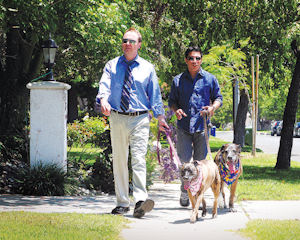President Barack Obama raised the national dialogue on gays and lesbians marrying earlier this month when he said in a television interview he supported same sex marriage. While that support was welcome in many parts of the country, it doesn’t change the fact that the federal government still won’t recognize these marriages or domestic partnerships when they file their taxes, making it that much more difficult to get through the already daunting tax filing process. Conflicts arise from the differences between what the IRS requires for tax filing and what individual states require, and sorting through the various laws can be complicated. Hiring a tax professional who has mastered the complexities of tax documents for same sex couples can make the process more manageable, though. Handling tax returns for same-sex couples and domestic partners has become a growing niche business at Wiesenberg & Co. in Studio City. It was an expansion of services already being provided to the gay and lesbian community. “A lot of (gays and lesbians) are entrepreneurs and those are the types of clients we look for,” said David Wiesenberg. He and his son Elisha have developed an expertise in working with tax-related complications that may arise for gay and lesbian couples. “We know this one step at a time,” said Elisha Wiesenberg. “When it changes, we just have to keep up with the new craziness.” Until same sex unions are recognized by the federal government, couples will have to operate with a dysfunctional tax code, or as Harlan Levinson called it, placing a square peg in a round hole. “There are certain things that will not fit perfectly and you have to figure it out the best you can,” said Levinson, a certified public accountant with a practice in Los Angeles. He estimated that 10 percent of his clients are registered domestic partners. In California, registered domestic partners can file a joint return just as a married couple would. The IRS does not recognize domestic partner relationships and requires that each partner file an individual return. A change to the federal tax code in 2010 has domestic partners from states with community property laws combining incomes and dividing the total in half for federal tax purposes. The splitting of incomes creates the complications, such as amounts on a W-2 form not matching amounts listed on a return. The rules are so Byzantine that some IRS workers are unaware of them. “I am not a fan (of this),” Levinson said. “The lower income people end up having to pay more for tax preparation.” When properly completed, domestic partnership tax returns require more work to draw up than those of single or joint filings. They require documentation of schedules and notes explaining the numbers. For those who are self-employed, splitting incomes adds an extra level of complexity because the IRS assumes that both partners are working for themselves. Sherman Oaks resident John Singh learned that when he and partner, Jeff Watson, had to file an amended 2010 return due to confusion over self-employment taxes. Singh owns and operates a communication and public relations firm in Burbank, while Watson works for an employer. “You go through the process of letter writing and phone calls and documentation that most people do not even give a thought to,” Singh said. Singh came to the Wiesenbergs to prepare his 2011 returns after doing extensive online research. He said other tax preparers were willing to handle the couple’s returns, but after talking to those firms it was obvious the preparers were not up to speed on IRS rule changes. “There is still a lot of education happening,” Singh said. “Given the testimonials and, more importantly, the conversation with Elisha (Wiesenberg), we felt this would be the place to go.” The Wiesenbergs explained to Singh what had been done wrong with the 2010 return and now are working with the IRS on the couple’s behalf. Once again, the IRS sent Singh and Watson a notification regarding self-employment taxes. Another frustration brought by a disagreement in state and federal filing requirements is that these returns cannot be filed electronically. Both the Wiesenbergs and Levinson must submit the return the old-fashioned way — on paper. The bottom line, says Elisha Wiesenberg, is that even with a topic as displeasing as paying taxes, same sex couples want to be recognized as a unit at the federal level. David Wiesenberg’s prediction: “They will get to it eventually.”
